Deborah J. Ross's Blog, page 58
November 22, 2019
Short Book Reviews: First-Rate Multiple POV Space Opera
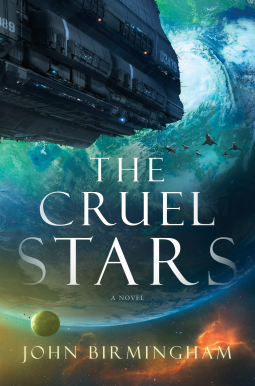 The Cruel Stars, by John Birmingham (Del Rey)
The Cruel Stars, by John Birmingham (Del Rey)The popularly conceived optimal number of point-of-view characters changes with the times, everything from only a single, first-person protagonist to a cast of thousands, er, dozens. I love how multiple points of view, even those that seem to be unrelated at the beginning, come together, and John Birmingham’s The Cruel Stars falls squarely in that category. The story begins with a handful of characters who seem to have little in common, except living in the same universe, in which humans have populated planets across the galaxy: a young lieutenant in one of the space navies, a princess of a planet’s ruling family, a curmudgeonly astroarchaeologist, and a space pirate. When the Human Republic, long defeated and exiled for their extreme opposition to any modification of “natural” humans – either by tech or genetic modification – attacks, their first move is through the galactic network linking everyone who’s logged in, essentially frying their brains and turning them into psychotic cannibals. With the leadership and aristocracy decimated, our disparate characters end up among the few competent people who are unaffected. Especially moving was the ship’s digital Intellect, who walls off and then essentially sacrifices themself, rather than spread the contagion to their human shipmates.
This space opera entertains endlessly with skillfully handled dramatic tension and first-rate world building.

Published on November 22, 2019 01:00
November 20, 2019
Today's Moment of Art
Published on November 20, 2019 09:51
November 15, 2019
Short Book Reviews: The Princess Bride Meets Princess Leia on a Space Station with Magic
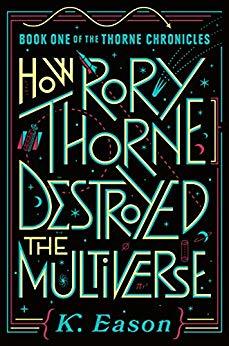 How Rory Thorne Destroyed the Multiverse, by K. Eason (DAW)
How Rory Thorne Destroyed the Multiverse, by K. Eason (DAW)The blurb for this entertaining coming-of-age in a weird mix of space opera and magic reads, The Princess Bride Meets Princess Leia. While I appreciate the ease of film references, I found the book more strongly reminiscent of Frank Herbert’s Dune.Most of the action takes place on a space station habitat rather than a desert planet, but many of the cultural and world-building elements are eerily similar. The young heroine (named Rory out of family tradition) is, like Paul Atreides, the heir to the throne. She’s protected and educated by a pair of extraordinary, dedicated teachers. From a early age, she learns not only personal self-control but the nuanced maneuvers of controlling others. And, like Paul, she’s caught up, in over her depth, in a complicated interplanetary struggle. In Rory’s world, however, computer nets are controlled by hexes and spells, and at her birth, fairies granted her various gifts, including the ability to detect falsehoods. This is indicated in the text by offset italics of what the person is actually thinking, with often humorous results.
like this…A peace treaty between Rory’s widowed mother and the scheming villain who murdered her father locks her into a betrothal (to a prince whose only public appearances are by his short-lived, imbecilic clones) and exile on the afore-mentioned space station. Cut off from her teachers, she’s forced to find new (and surprising) allies and most of all, to come into her own power. I love that she makes mistakes, and that her opponents are formidable. The risk to her, the people she cares about, and her home world are equally daunting.
Enormous fun. Highly recommended.

Published on November 15, 2019 01:00
November 13, 2019
Today's Moment of Art
Published on November 13, 2019 01:00
November 11, 2019
"Many Teeth" in Sword and Sorceress 34.
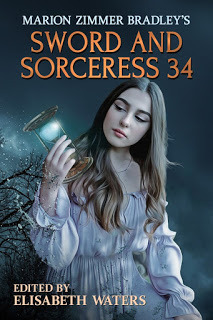 The last volume of Sword and Sorceress, edited by Elisabeth Waters, is now out (at all the usual venues), and it contains my novelette, "Many Teeth." Like many others, I am sad to see this series end, although 34 issues of an anthology demonstrates extraordinary staying power. My very first professional sale was to the debut issue, and I've been in almost every one since (except the overflow volume, the year I lived in France and the year my younger daughter was born -- a month after the deadline). I co-edited Sword and Sorceress 33, which was a delight and allowed me to work with a number of splendid authors who were new to me.
The last volume of Sword and Sorceress, edited by Elisabeth Waters, is now out (at all the usual venues), and it contains my novelette, "Many Teeth." Like many others, I am sad to see this series end, although 34 issues of an anthology demonstrates extraordinary staying power. My very first professional sale was to the debut issue, and I've been in almost every one since (except the overflow volume, the year I lived in France and the year my younger daughter was born -- a month after the deadline). I co-edited Sword and Sorceress 33, which was a delight and allowed me to work with a number of splendid authors who were new to me.Much has been said about this series and its importance in the genre. That first volume, edited by Marion Zimmer Bradley, came out in 1984, a tidal surge of women's voices in science fiction and fantasy. Sword and Sorceress extended that inclusion to the romantic, action-adventure style of "sword and sorcery." Bradley wanted strong, resourceful women characters who were more than cardboard copies of the male heroes ("Conan in drag"). To this end, she sought out writers like C. J. Cherryh, Mercedes Lackey, Elizabeth Moon, Pat Murphy, Rachel Pollack, Laurell K. Hamilton, Charles de Lint, Diana L. Paxson, Emma Bull, and Jennifer Roberson.
As I contemplated what I might submit to this final volume, I returned to an image that had come to me after watching a well-known movie with animated dinosaurs: a swordswoman wielding a katana, facing down a velociraptor.* As with most inspirations, that scene didn't exactly feature in the story...but close.
*Yes, I know the critters in the movies are paleontologically inaccurate...
Here's a snippet from the story:
The inner door swung open and a young woman entered. Karan’s first impression was of a lioness suddenly finding herself in the midst of a fancy dress ball. The gown was of silk, the hair set with pearls and tiny winking gems. But the skin was sun-browned, the cheeks innocent of rouge powder, and the expression one of determination.
“Leave us,” the young woman said to her attendant. Once they were alone, she approached Karan. “Please, let us sit together.” Karan lowered herself into a chair, choosing one that put her back to the nearest wall. “I’m Estelle Rockland, and my father is Sir Henry Rockland.” When Karan looked blank, Estelle explained that he was a founding member of the Royal Society of Naturalist Adventurers. “Never heard of it,” Karan said. “There’s no reason you should. I’m not sure anyone cares who they are or what they do, beyond their own membership and the Lord of the Keys, who supervises the royal charters. For the past twenty-five years, my father has been on a single-minded quest, and now he’s gone missing. I want you to find him.” “Tracking down errant lord-naturalists is not the sort of work I usually do. Doesn’t sound like there’s much need for a sword. You’d fare better with someone accustomed to finding missing people.” “That’s the point exactly,” Estelle said. “This is no ordinary search. I cannot undertake it by myself. I must have protection, and I am assured you are the best. I promise you, your wits as well as your sword will be required.” “And the payment?” Karan asked, half-hoping it would be paltry enough so that she might walk away with an unsullied conscience.
Estelle named a sum so generous that Karan would not have to work for several years. Besides, she liked the look of her prospective employer, the sun-browned skin coupled with the level gaze and straightforward speech. She’d wager Estelle had not spent all her years in a bower, embroidering pillows. And she knew a thing or two about wayward parents. “And where might we look for your father? What was his destination?” she asked. Estelle shook her head. “I will not divulge that until we have a contract. You agree that even if you do not accept this commission, you will not divulge what I’m about to tell you?” “I have a feeling nobody would believe me if I did.” “My father still has a bit of his former reputation to protect, and I would not have that taken from him by idle chatter. You see, you are quite correct. No one would believe you. Just about everyone will conclude that you — and he — are quite mad. So hear me out before you walk away.” “I’m listening.” “My father’s destination was Jökull.” “Jökull? The land beneath the northern volcanoes? Home of the ice giants? Please. That’s a child’s tale. It’s no more real than Hy-Brasil or Lemuria. It doesn’t exist.” “My father believes it does exist, that there is an island of ice volcanoes far to the north of the Frozen Sea. He mounted an expedition based on references he’s accumulated over the decades, some of them very obscure. I know because I helped him translate them.” She sighed. “Now I fear the worst.” That seemed the likely conclusion for anyone haring off to such a dangerous region as the Frozen Sea. “What inquiries have you made?” “None of his contacts in the arctic archipelago have heard from him. I know what you’re thinking — an elderly man, a scholar, embarking upon such a hazardous quest. But this would not be his first venture where few others dared. He’s explored Afrique as far south as the Black River. He’s documented the Painted Caves high in the Gopal Range. He knows how to prepare, and he hired the best bodyguard he could find.” “It’s a fool’s errand.” Estelle’s chin lifted and her mouth set in a stubborn line. “Nevertheless, I will go after him. Are you too cowardly to accompany me?” Karan stirred in her seat. “Cowardice has nothing to do with it. Good sense and a desire to keep living, with all my limbs reasonably intact, does.” “Is the fee not adequate? Your boots have seen better days, and from what I have heard around the district, it’s been a long time since you’ve had steady work. You need this job.” “And words like those will not induce me to take it.” Still, Estelle’s determination renewed her curiosity.
“There is another reason why you must agree.” “And what is that?” “My father is not the only member of that expedition in need of rescue. My father’s bodyguard was none other than One-Eyed Wanda.” The name hung in the air. Karan’s mouth dropped open. How many One-Eyed Wandas could there be in the world, especially ones who hired on as bodyguards? Mother mine, what have you gotten yourself into?

Published on November 11, 2019 01:00
November 8, 2019
Short Book Reviews: Teaming up To Stop the Apocalypse
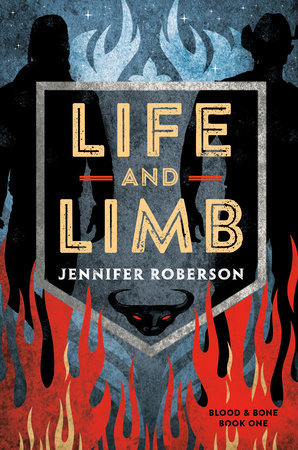 Life and Limb, by Jennifer Roberson (DAW)
Life and Limb, by Jennifer Roberson (DAW)A new Jennifer Roberson novel is always a treat, but a new Jennifer Roberson series is a cause for celebration. It should be obvious from my opening sentence that I am a huge fan. I’ve been an avid reader since her debut, Shapechangers (1984, the first “Cheysuli” novel). The way she combines action, ideas, internal struggle, and romance hit just the right notes for me. More importantly, I love how her work has matured and deepened over time. It seems to me that every time she takes a break or begins something new, I see a quantum leap in skill and insight.
Life and Limb, the first volume in her new “Blood and Bone” series, is no exception. She’s begun with a nifty concept: an ex-con biker (Gabriel Harlan) teams up with a clean-cut cowboy (Remi McCue) to fight supernatural nasties and stop the looming apocalypse. And oh yes, they both grew up with a mysterious grandfather, Grandaddy Jubal Horatio Tanner who isn’t human, and neither are they, or not entirely.
In many ways, Life and Limb is the set-up for that conflict, the origin story. Certainly, there’s plenty of action, both internal and external, and a host of adversaries and allies. Grandaddy Jubal has other teams to enlist, so he leaves our heroes in the care of Lily Morrigan (as in “The” Morrigan, the Celtic goddess of war, fate and death). Hell’s vents have opened, pouring forth an army of mythological nasties (ghosts, vampires, black dogs, and the like) which now can get infected by demons. Their skills are complementary: Gabe is a crack shooter with guns, but Remi is expert with throwing knives. Gabe has an unerring sense for the rightness (or wrongness) of a place, while Remi’s gift is reading people. And while they’re sniffing out and doing away with demonic presences, the Morrigan tells them, “hell knows you’re here.”
The narrative voice, from Gabe’s first-person perspective, is richly evocative, and the handling of detail, setting and nuance is top-notch, flavored with my favorite cultural references. Therein lies both the book’s strength and its challenge. The heart of the book’s energy, its center, is the emotional and spiritual journey of these two characters. Neither just accepts at face value their angelic nature or their destiny. Much of the story revolves around challenging what they have been told, grappling with how their lives will never the same, figuring out what each means to the other, and along the way making near-fatal mistakes, either from inflated self-confidence or ignorance. They learn by slow steps, often circling around to the same questions before moving on. This is how we humans deal with events and information that changes our entire understanding of the cosmos and our role in it. We question, we negotiate, we accept, then we question some more. Sometimes we have to ask the same questions over and over in different ways until the answers make sense. All the while, these characters get to know one another, overcoming skepticism and distrust. Much of the pleasure of reading a character-rich novel is in falling in love with those characters.
Bottom line: I adored this awesome urban fantasy and can’t wait for the next volume.

Published on November 08, 2019 01:00
November 6, 2019
Today's Moment of Art
Published on November 06, 2019 01:00
November 1, 2019
Short Book Reviews: Scathing Industrial-Political Science Fiction
The Warehouse, by Rob Hart (Crown)
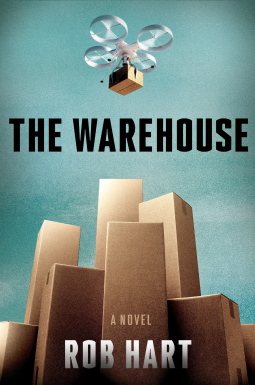
This dystopian thriller with shades of Kafka and Frank Norris’s The Octopus centers on a bloated industrial empire in which merchandise of all kinds is stored, picked, packaged, and delivered via drones. The vast complex, set in a desert 100 miles from the nearest town, is not only the workplace for thousands, but its living quarters, medical, food, and recreational facilities. It’s all presided over by an avuncular “old white dude” who prides himself on having passed legislation to outlaw unions, do away with worker safety, and so forth, all under the guise of providing environmentally clean delivery of goods and great jobs for anyone willing to work hard. The true “MotherCloud” warehouse complex is anything but utopian. Work, especially for the “pickers,” is unrelentingly brutal, and security turns a blind eye to sexual harassment and other crimes for the sake of good reporting statistics. The enclosed environment, although air conditioned, is monotonous and humdrum, with few choices beyond soporific entertainment, alcohol, and illegal drugs.
Into this world come two applicants. John is an ex-prison guard whose dream of independent entrepreneurship came to a screeching halt with “The Cloud” stole his invention. He hopes to work anywhere but security, but that’s his assignment. Zinnia presents as a bright young teacher, taking time off to earn extra cash, but she is actually a corporate spy, hired to find out why the MotherCloud uses so much less energy than it actually requires. The mind-numbing work changes each of them.
Scathing condemnation of computerized factory life and its dehumanizing brutality, along with the naïve blindness of the privileged few, makes this book a stand-out for thoughtful political science fiction. If you aren’t outraged, you’re not paying attention.

This dystopian thriller with shades of Kafka and Frank Norris’s The Octopus centers on a bloated industrial empire in which merchandise of all kinds is stored, picked, packaged, and delivered via drones. The vast complex, set in a desert 100 miles from the nearest town, is not only the workplace for thousands, but its living quarters, medical, food, and recreational facilities. It’s all presided over by an avuncular “old white dude” who prides himself on having passed legislation to outlaw unions, do away with worker safety, and so forth, all under the guise of providing environmentally clean delivery of goods and great jobs for anyone willing to work hard. The true “MotherCloud” warehouse complex is anything but utopian. Work, especially for the “pickers,” is unrelentingly brutal, and security turns a blind eye to sexual harassment and other crimes for the sake of good reporting statistics. The enclosed environment, although air conditioned, is monotonous and humdrum, with few choices beyond soporific entertainment, alcohol, and illegal drugs.
Into this world come two applicants. John is an ex-prison guard whose dream of independent entrepreneurship came to a screeching halt with “The Cloud” stole his invention. He hopes to work anywhere but security, but that’s his assignment. Zinnia presents as a bright young teacher, taking time off to earn extra cash, but she is actually a corporate spy, hired to find out why the MotherCloud uses so much less energy than it actually requires. The mind-numbing work changes each of them.
Scathing condemnation of computerized factory life and its dehumanizing brutality, along with the naïve blindness of the privileged few, makes this book a stand-out for thoughtful political science fiction. If you aren’t outraged, you’re not paying attention.

Published on November 01, 2019 01:00
October 30, 2019
Today's Moment of Art
Published on October 30, 2019 10:24
October 28, 2019
Auntie Deborah’s Autumn Writing Advice Column
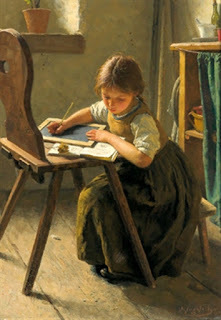 More tidbits from the desk of a hard-working author.
More tidbits from the desk of a hard-working author.Dear Auntie Deborah: Help! My characters have gone amok and won’t follow the plot of my book! What can I do to whip them into shape?-- A Frustrated Author
Dear Frustrated: The short (but brutal) answer is that your characters behave the way you created them. Their histories, personalities, goals, and motivations are all part of that creation. So if you — like so many of us! — find your characters resisting the demands of the plot or going off on their own adventures, it’s time to take a step back and delve deeper into what’s on the page and what’s in your creative imagination that isn’t explicit but nonetheless exerts a powerful influence over the character’s behavior.Looking at it another way, stories can be driven by plot (a series of actions where one leads inevitably to the next) or by character (the motivations and inner conflicts dictate the character’s goals and actions). (Other possibilities include ideas — mysteries, for example — or environments — where the world itself is the focus. But your problem really pertains to the competing demands of plot versus character.)If you’ve conceived of the story as a plotline first and foremost, of course you want interesting characters but you also want them to follow the script. One way to do this is to work backward to discover what kind of person would make those choices and have what it takes to overcome those obstacles. You cannot simply plug any character into any role and have it work (unless your characters are all “cardboard.”) “Misbehavior” = mismatched personalities and roles.If, on the other hand, you have a compelling, fascinating character with an agenda of her own that doesn’t fit your plotline, you can always chuck the script and see where the story goes when driven by this character.
Dear Auntie Deborah: Why are poets so underpaid in comparison to novelists?-- Impoverished Poet
Dear Impoverished:I can speak best about my field: I write science fiction and fantasy, at a pro level for over 30 years, at lengths ranging from about 5,000 words (short for me) to 150,000 (on the long side for me). Typically short fiction is paid by the word, and the current pro rate is 8 cents/word. So that 5,000 word short story would be paid $400. Very few modern poems are even that long. Go back a couple of hundred years, and you’ll find book-long works of poetry, but not today. So poetry is typically paid not by the word but by the piece, often around $50. Most poetry magazines can’t afford to pay more, btw, even if they’re subsidized by universities.If this seems unfair, it is! Poems are not easier to write than prose. They’re exquisite little gems, where every word must be exactly right, and the whole is crafted for precise emotional and intellectual impact. I’ve written a little as part of my novels (like song lyrics or quotes of poems a character has created) and it’s exhausting. I’d rather write pages and pages of prose narrative than a 10 line poem. So it’s likely that a poet’s output will be much less in terms of word count.All that said, poets are treasures of their culture and until recently have been supported by wealthy or noble patrons who recognized how poetry gives voice to the best ideas of its age. Today, as pointed out elsewhere, accomplished poets are likely to be supported by grants or other awards. That happens occasionally for novelists, but mostly not. I’m in awe of true poets, in view of how painfully I wrestle with a few lines here and there, while turning out an entire novels is relatively child’s-play.
Dear Auntie Deborah: Which is easier to write, a screenplay or a novel?-- Get Rich Quick Dear Get Rich:Is writing poetry easier than writing screenplays? Is writing screenplays easier than playing jazz piano? Is dancing ballet easier than writing a novel? Is painting a landscape in oils easier than singing in an opera?Everyone’s mileage varies. All of these (and more) are different art forms, to which are suited by temperament, training, and experience.If you’re looking for something that is “easy” and does not require discipline and dedication, try… I can’t think of anything worthwhile that doesn’t.
Dear Auntie Deborah: What should you not do when writing a character’s backstory?-- Confused Newbie
Dear Confused: Don’t inflict it on your reader in massive, indigestible chunks that bring the action to a screeching halt.

Published on October 28, 2019 01:00











